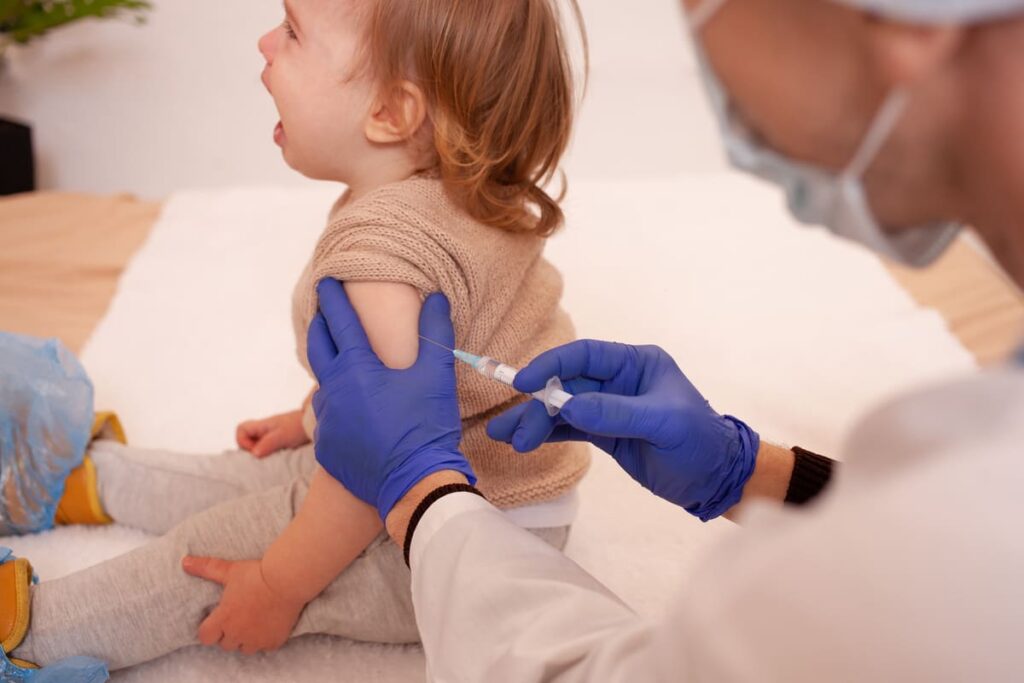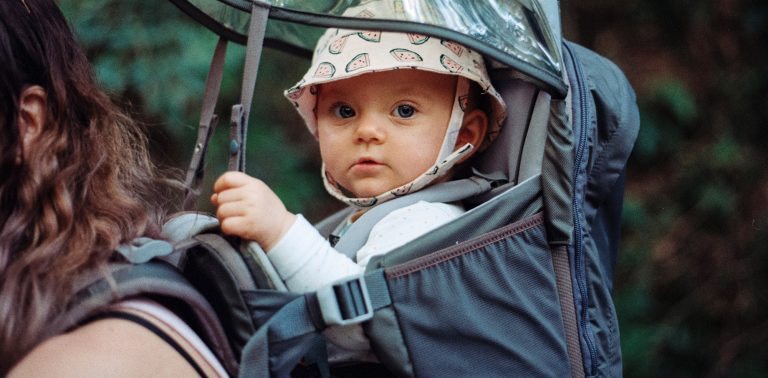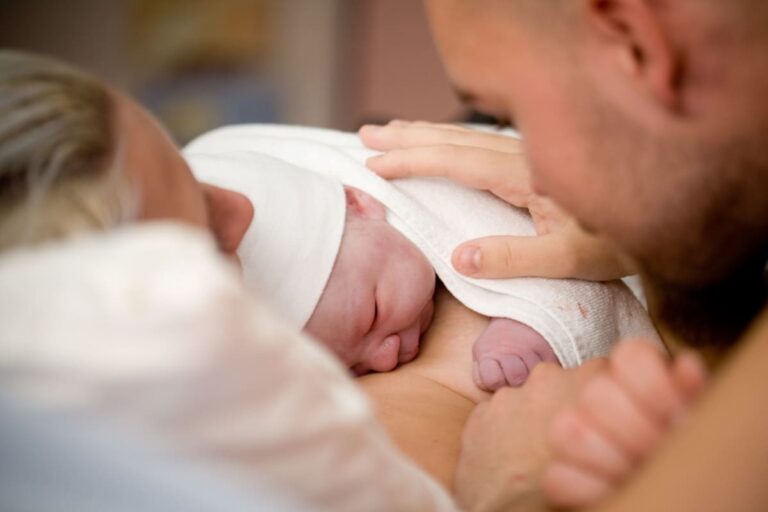Vaccinations are an important aspect of keeping your baby healthy and protected from various serious diseases. However, one common concern among parents is the pain that their babies may experience during and after getting vaccinated.
Baby vaccinations typically involve a shot or injection, which can cause some level of discomfort and pain. As per the Canadian Medical Association Journal (CMAJ), the pain caused by vaccinations is rated as moderate to severe in young infants and toddlers. But how long does this pain last? In this blog, we will discuss the duration of vaccination pain in babies and how you can help ease their discomfort.
Key Takeaways:
- Childhood vaccines can cause moderate to severe pain in babies.
- Pain at the injection site can last for up to 48 hours.
- Distracting your baby during the injection may also help reduce their pain perception.
- For disease control and prevention, it is important to follow the recommended vaccine schedule for your baby.
In This Article
How Long Can Babies Feel Pain After Vaccination?
After receiving vaccinations, it is normal for babies to experience some discomfort and pain. According to the American Academy of Pediatrics, pain at the injection site can last for up to 48 hours. This is because vaccines contain substances that stimulate the body’s immune system and can cause inflammation, which may lead to mild soreness and redness at the injection site.
Generally, childhood vaccination pain is at its peak within the first 24 hours and gradually decreases after that. However, this timeline can vary depending on the type of vaccine given and your baby’s response to it. Some common vaccines, such as:
- Hepatitis B vaccine
- Measles vaccine
- Diphtheria Tetanus Pertussis vaccine
- Polio
- Pneumococcal vaccine
- Rotavirus vaccine
These vaccines may cause mild to moderate pain lasting up to 2 days. On the other hand, vaccines like:
- Chickenpox (Varicella) vaccine
- MMR (measles-mumps-rubella) vaccine
- Meningitis vaccine
- Flu vaccine
These may cause pain and discomfort for a shorter duration, usually up to 2-3 days. However, some babies may have a higher pain tolerance or experience less discomfort than others. Also, Seattle Children’s Hospital recommends that if the pain continues for more than 2 days or there is excessive swelling, redness, or other alarming symptoms at the injection site, it is important to consult your child’s healthcare provider.

What Symptoms of Vaccination Pain in Babies?
Babies may experience varying levels of discomfort and pain during the vaccination process. Some common immunization reactions include:
- Crying or irritability: Your baby may cry or become fussy due to the discomfort at the injection site. If your fussy baby is also running a fever, you may give them medication like acetaminophen to help ease their pain.
- Mild swelling: Inflammation or redness at the injection site is normal and usually subsides within 24-48 hours. However, if the swelling is excessive or continues for more than 2 days, consult your baby’s health care provider.
- Mild fever: This is one of the normal reactions to vaccinations and may last for a day or two. You can give your baby plenty of fluids and dress them lightly to keep their body temperature from rising.
- Loss of appetite: Babies may have a slightly reduced appetite after getting vaccines, but this is temporary and should return to normal within 1-2 days. If your baby is not eating at all, consult your child’s pediatrician.
- Difficulty sleeping: Due to soreness and discomfort, your baby may have a hard time falling asleep or staying asleep. Generally, the child’s arm or leg where the injection was given may be sore, so try to avoid pressure on that body part while sleeping.
- Vomiting and diarrhea: In some rare cases, babies may experience mild stomach upset, diarrhea, or vomiting after vaccinations. This is usually mild and resolves on its own within a day or two.
How To Manage Vaccine Pain in Babies?
Although a vaccination procedure may cause some level of pain and discomfort, there are ways to help ease your baby’s pain. To reduce vaccination pain and discomfort in your baby, you can try these tips:
- Hold your baby close: Offering skin-to-skin contact before, during, and after vaccine administration can help comfort and soothe your baby. This close physical contact has been shown to reduce pain perception and promote a sense of security.
- Breastfeeding: If you are breastfeed/breastfeeding, nursing your baby during or immediately after the vaccination can provide comfort and minimize pain. The act of breastfeeding releases natural pain-reducing hormones and provides a familiar and calming environment for your little one.
- Distraction Techniques: Engaging your baby’s attention with toys, music, or singing during the vaccination process can help divert their focus from the discomfort. By providing a positive distraction, you can help minimize pain perception and create a more positive experience.
- Combination Vaccines: Opting for combination vaccines when available can be beneficial. These vaccines, which combine multiple immunizations into a single shot, reduce the number of injections required, thereby minimizing overall pain.
- Local Anesthetic Creams: Applying a topical anesthetic cream, such as lidocaine, to the injection site before the vaccine is administered can help numb the area and pain reduction.
- Cold Compress: Applying a cold compress, such as a clean, cool cloth, to the injection site after the vaccine can help alleviate pain and reduce swelling. The cold temperature provides a numbing effect and offers temporary relief.
- Pain-Relieving Medication: In some cases, your healthcare provider may recommend over-the-counter pain-relief medication suitable for infants, such as acetaminophen (paracetamol), to help manage vaccine pain.
- Monitor for Allergic and Delayed Reactions: While minimizing pain is crucial, it is equally important to monitor your baby for any signs of allergic reactions to the vaccines.

When to Seek Medical Attention?
Though most vaccination pain and discomfort are mild and temporary, there are instances when you should contact your child’s doctor immediately. These include:
- If the swelling at the injection site continues to increase or does not go away after a few days
- If your baby experiences difficulty breathing or swallowing
- If they develop a rash, high-grade fever (above 102 F), or any other severe symptoms
- If reducing vaccination pain in your baby becomes increasingly difficult despite trying various methods.
Furthermore, combination vaccine shots, like the DTaP vaccine, may cause moderate side effects such as fever and irritability. However, these reactions typically last for a short duration and are mild in intensity. In case you notice any symptoms or are concerned about your baby’s reaction to the vaccines, talk to your healthcare provider immediately.
Conclusion
In summary, vaccines are essential for protecting your baby from harmful diseases, but they may cause some temporary discomfort and pain. By using these tips and monitoring your baby’s reactions, you can help minimize vaccination pain and make the experience less stressful for both you and your little one. Remember always to consult your healthcare provider if you have any concerns or questions about managing vaccine pain in babies!
FAQs
Can we apply an ice pack after vaccination?
Yes, applying an ice pack after vaccination can help reduce pain and swelling at the injection site. The cold temperature provides a numbing effect and offers temporary relief.
Can I bathe a baby after vaccination?
Are vaccine side effects possible?
Can I give my baby paracetamol after vaccination?
Do Babies sleep a lot after vaccines?
Reference:











